Thousands of protesters demonstrate in Amsterdam against Israel’s war on Gaza.
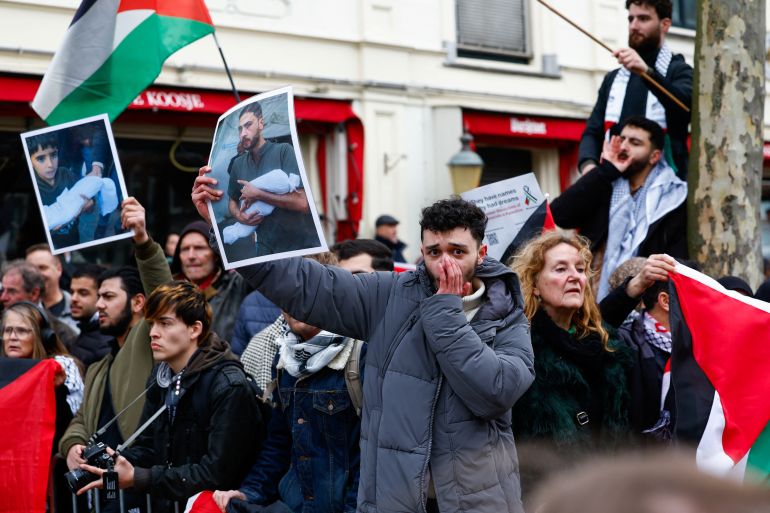
Demonstrators hold pictures and Palestinian flags as they protest in front of the National Holocaust Museum on the day of its opening in the Netherlands
[Piroschka van de Wouw/Reuters]
Published On 10 Mar 2024
Israeli President Isaac Herzog has attended the opening of the National Holocaust Museum in Amsterdam, the Netherlands, where his presence prompted protests over Israel’s war in Gaza.
The opening took place on Sunday as pro-Palestine demonstrators chanted “Never again is now” and “Ceasefire now” near a square close to the museum.
Thousands of protesters demonstrated against Israel’s war on Gaza, which has killed more than 31,000 people since October, according to Palestinian health authorities. Israel launched the assault after Hamas, the Palestinian armed group that governs Gaza, led an attack on Israel on October 7, killing at least 1,139 people, according to an Al Jazeera tally based on official Israeli statistics.
Human rights group Amnesty International put up detour signs around the new museum to direct Herzog to the International Court of Justice (ICJ) in The Hague. In January, South Africa brought a case against Israel at the ICJ over allegations it was committing genocide in Gaza. A final ruling could take years, but the court ordered several provisional directions, including an order for Israel to prevent acts of genocide.
Nazi persecution
The Holocaust museum showcases the stories of the 102,000 Jews who were deported from the Netherlands and murdered in Nazi camps, as well as their persecution under German World War II occupation.
Three-quarters of Dutch Jews were among the six million Jews systematically murdered by the Nazis.
“This museum shows us what devastating consequences anti-Semitism can have,” said Dutch King Willem-Alexander at a gathering at a nearby synagogue.

Dutch King Willem-Alexander speaks at the opening ceremony of the National Holocaust Museum at the Portuguese synagogue in Amsterdam, the Netherlands, March 10, 2024
[Bart Maat/Pool via Reuters]
Dutch Jewish anti-Zionist organisation Erev Rave, which organised the demonstrations at the musuem’s opening with the Dutch Palestinian community and Socialist International, said that while it is important to honour the memory of Holocaust victims, it cannot stand by while the war in Gaza continues.
“For us Jews, these museums are part of our history, of our past,” said Joana Cavaco, an activist with Erev Rav, addressing the crowd before the museum’s opening ceremony. “How is it possible that such a sacred space is being used to normalise genocide today?”
A pro-Palestinian Dutch organisation, The Rights Forum, called Herzog‘s presence “a slap in the face of the Palestinians who can only helplessly watch how Israel murders their loved ones and destroys their land”.
In a statement before the museum’s opening, the Jewish Cultural Quarter that runs the museum said it is “profoundly concerned by the war and the consequences this conflict has had, first and foremost for the citizens of Israel, Gaza and the West Bank”.
It added that it is “all the more troubling that the National Holocaust Museum is opening while war continues to rage. It makes our mission all the more urgent.”
The museum told the media that it had invited Herzog before the events of October 7. It said in a statement that it recognised that Herzog’s attendance was controversial, but that he represents the country where Dutch Holocaust survivors migrated to.
Dutch Jewish anti-Zionist organisation Erev Rave, which organised the demonstrations at the musuem’s opening with the Dutch Palestinian community and Socialist International, said that while it is important to honour the memory of Holocaust victims, it cannot stand by while the war in Gaza continues.
“For us Jews, these museums are part of our history, of our past,” said Joana Cavaco, an activist with Erev Rav, addressing the crowd before the museum’s opening ceremony. “How is it possible that such a sacred space is being used to normalise genocide today?”
A pro-Palestinian Dutch organisation, The Rights Forum, called Herzog‘s presence “a slap in the face of the Palestinians who can only helplessly watch how Israel murders their loved ones and destroys their land”.
In a statement before the museum’s opening, the Jewish Cultural Quarter that runs the museum said it is “profoundly concerned by the war and the consequences this conflict has had, first and foremost for the citizens of Israel, Gaza and the West Bank”.
It added that it is “all the more troubling that the National Holocaust Museum is opening while war continues to rage. It makes our mission all the more urgent.”
The museum told the media that it had invited Herzog before the events of October 7. It said in a statement that it recognised that Herzog’s attendance was controversial, but that he represents the country where Dutch Holocaust survivors migrated to.

A flyer with a picture of Israeli President Isaac Herzog lies on the site of a protest in front of the National Holocaust Museum
[Piroschka van de Wouw/Reuters]
Herzog’s remarks that not only armed groups but “an entire nation” was responsible for the October 7 attack and that Israel will fight “until we break their backbone” have been cited by South Africa in its ICJ lawsuit against Israel.
Herzog has said his comments were misrepresented, and only part of what he said was cited in order to build a case against Israel in the ICJ.
The Israeli leader said the museum sent “a clear and powerful statement: remember, remember the horrors born of hatred, anti-Semitism and racism and never again allow them to flourish”.
Herzog’s remarks that not only armed groups but “an entire nation” was responsible for the October 7 attack and that Israel will fight “until we break their backbone” have been cited by South Africa in its ICJ lawsuit against Israel.
Herzog has said his comments were misrepresented, and only part of what he said was cited in order to build a case against Israel in the ICJ.
The Israeli leader said the museum sent “a clear and powerful statement: remember, remember the horrors born of hatred, anti-Semitism and racism and never again allow them to flourish”.
SOURCE: AL JAZEERA AND NEWS AGENCIES
‘You cannot look away’: Amsterdam Holocaust museum opens amid protests
The Dutch have long found it hard to face up to the horrors of the Nazi occupation when at least 100,000 Jews were murdered. Until now
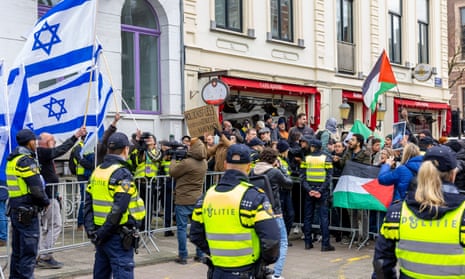
The Dutch have long found it hard to face up to the horrors of the Nazi occupation when at least 100,000 Jews were murdered. Until now

Demonstrators and police at the opening of the National Holocaust Museum at the Portuguese synagogue in Amsterdam.
Photograph: Rex/Shutterstock
Senay Boztas
Senay Boztas
in Amsterdam
Sun 10 Mar 2024
THE GUARDIAN
Three-quarters of the Dutch Jewish population – 102,000 people – were killed by the Nazis during the second world war, the highest proportion in western Europe. But, unlike some other countries, the Netherlands has never had a national museum devoted to those horrors.
That changed on Sunday when, eight decades after the second world war and in the presence of the Israeli president, Isaac Herzog, the Dutch king opened the country’s first Holocaust museum on the site of an Amsterdam creche and former teaching college where 600 children were smuggled to safety.
Wearing a kippah, the monarch, Willem-Alexander, said: “There is no excuse for not knowing, no room for perspective. Ifs and buts are not appropriate here. Knowing about the Holocaust is not optional. This museum shows us what happened. And not so very long ago.”
Herzog, whose attendance sparked protests amid Israel’s continuing offensive in Gaza, said the museum sent “a clear and powerful statement: remember, remember the horrors born of hatred, antisemitism and racism and never again allow them to flourish.”
“Unfortunately never again is now, right now. Because right now, hatred and antisemitism are flourishing worldwide and we must fight it together,” added the president.
Waving Palestinian flags and banners, protesters in a square close to the museum voiced their anger at his visit, chanting “ceasefire now”. The human rights group Amnesty International, meanwhile, put up detour signs around the museum to direct Herzog to the international court of justice in The Hague.
Emile Schrijver, the general director of the new National Holocaust Museum in Amsterdam, said in an interview before the opening that the venue would – at last – give the Holocaust “a place in the collective [Dutch] memory”.
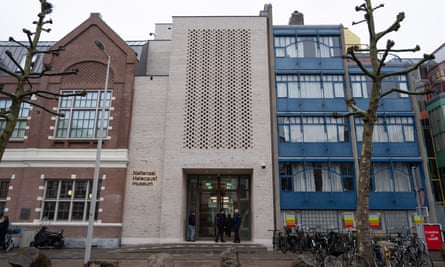
Three-quarters of the Dutch Jewish population – 102,000 people – were killed by the Nazis during the second world war, the highest proportion in western Europe. But, unlike some other countries, the Netherlands has never had a national museum devoted to those horrors.
That changed on Sunday when, eight decades after the second world war and in the presence of the Israeli president, Isaac Herzog, the Dutch king opened the country’s first Holocaust museum on the site of an Amsterdam creche and former teaching college where 600 children were smuggled to safety.
Wearing a kippah, the monarch, Willem-Alexander, said: “There is no excuse for not knowing, no room for perspective. Ifs and buts are not appropriate here. Knowing about the Holocaust is not optional. This museum shows us what happened. And not so very long ago.”
Herzog, whose attendance sparked protests amid Israel’s continuing offensive in Gaza, said the museum sent “a clear and powerful statement: remember, remember the horrors born of hatred, antisemitism and racism and never again allow them to flourish.”
“Unfortunately never again is now, right now. Because right now, hatred and antisemitism are flourishing worldwide and we must fight it together,” added the president.
Waving Palestinian flags and banners, protesters in a square close to the museum voiced their anger at his visit, chanting “ceasefire now”. The human rights group Amnesty International, meanwhile, put up detour signs around the museum to direct Herzog to the international court of justice in The Hague.
Emile Schrijver, the general director of the new National Holocaust Museum in Amsterdam, said in an interview before the opening that the venue would – at last – give the Holocaust “a place in the collective [Dutch] memory”.

The new National Holocaust Museum in Amsterdam. Photograph: Peter Dejong/AP
“It reflects a very long history of processing and the invisibility of this subject in Dutch public space. For a long time much of the community felt that there was no room for the specifics of the Jewish experience in the war,” he said.
“But now we are here, and the question is why now? Because we can show the people who are the natural owners of this history, the survivors, that we mark their history here, and in 10 or 15 years, when they are no longer here, we will still be here to tell it. And it is to show a new generation the importance of Dutch history and an awareness of what can happen if you set people apart, treat people as ‘other’ and in the end take away their humanity.”
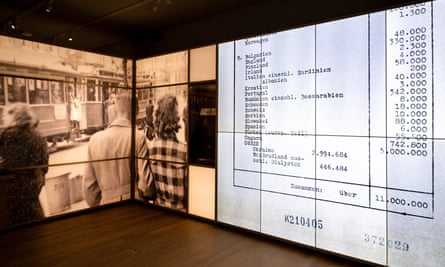
“It reflects a very long history of processing and the invisibility of this subject in Dutch public space. For a long time much of the community felt that there was no room for the specifics of the Jewish experience in the war,” he said.
“But now we are here, and the question is why now? Because we can show the people who are the natural owners of this history, the survivors, that we mark their history here, and in 10 or 15 years, when they are no longer here, we will still be here to tell it. And it is to show a new generation the importance of Dutch history and an awareness of what can happen if you set people apart, treat people as ‘other’ and in the end take away their humanity.”

Projections on the walls of the National Holocaust Museum. Photograph: Nick Gammon/ANP/AFP/Getty Images
Salo Muller, who was smuggled as a three-year-old child through the creche, said the museum’s opening was an important moment.
“I am happy that the Holocaust museum is really coming,” said Muller, now 88. “It is essential that people have an insight into what happened to the Jewish people. It’s not for me – because I know it all – but for people who are not Jewish, who don’t know.”
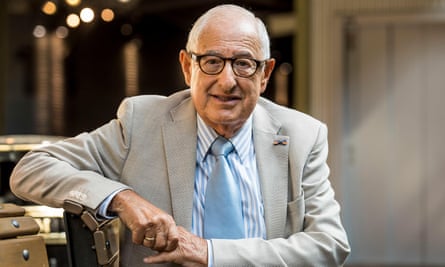
Salo Muller, who was smuggled as a three-year-old child through the creche, said the museum’s opening was an important moment.
“I am happy that the Holocaust museum is really coming,” said Muller, now 88. “It is essential that people have an insight into what happened to the Jewish people. It’s not for me – because I know it all – but for people who are not Jewish, who don’t know.”

Salo Muller: ‘It’s essential for people who are not Jewish, who don’t know.’ Photograph: Pro Shots/Alamy
Some, including Johannes Houwink ten Cate, emeritus professor and former researcher at the NIOD Institute for War, Holocaust and Genocide Studies, point out it has been a long journey. “We have seen ourselves as a nation of tolerance and resistance,” he said.
“We did not want to see ourselves as a nation involved in collaboration with the Nazis. We saw ourselves as the nation of Anne Frank. Thus, it hurts when we are forced to see ourselves as the nation of the tram driver transporting the Frank family to the station and from there to a transit camp, and to a death camp from there. Holocaust awareness came late.”
On the other side of the street from the museum, the former Hollandsche Schouwburg theatre, where 46,000 Jewish people were held on their way to the camps, is now a memorial.
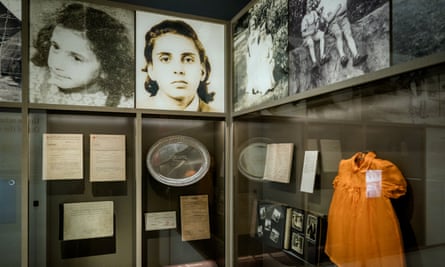 View image in fullscreenThe National Holocaust Museum in Amsterdam. Photograph: Bart Maat/ANP/AFP/Getty Images
View image in fullscreenThe National Holocaust Museum in Amsterdam. Photograph: Bart Maat/ANP/AFP/Getty Images
This week, evidence emerged of 23 bills that GVB Amsterdam trams sent to be paid by the Nazis for transporting Jewish people, journeys documented in the acclaimed film and book Occupied City by Bianca Stigter and her husband, the British film-maker Steve McQueen. The Amsterdam mayor, Femke Halsema, called GVB’s collaboration “shameful”.
So while the Holocaust Museum is “a decisive moment in Dutch memory culture”, focusing on more than resistance, military rescue and victims in general, there’s more to uncover, according to Bart Wallet, the professor of modern Jewish history at the University of Amsterdam. “Society is not yet finished with the Holocaust,” he said. “It is still more or less an open wound and there are parts of society that are still in the process of facing their war histories.”
But the museum was a start, said Muller. “In the Hollandsche Schouwburg, there are ‘drops’ on the wall, in each is a photo and you can hear people’s stories,” he said. “I am one of the drops. Like the museum, it is a place full of meaning. It makes you still. You cannot look away.”
Some, including Johannes Houwink ten Cate, emeritus professor and former researcher at the NIOD Institute for War, Holocaust and Genocide Studies, point out it has been a long journey. “We have seen ourselves as a nation of tolerance and resistance,” he said.
“We did not want to see ourselves as a nation involved in collaboration with the Nazis. We saw ourselves as the nation of Anne Frank. Thus, it hurts when we are forced to see ourselves as the nation of the tram driver transporting the Frank family to the station and from there to a transit camp, and to a death camp from there. Holocaust awareness came late.”
On the other side of the street from the museum, the former Hollandsche Schouwburg theatre, where 46,000 Jewish people were held on their way to the camps, is now a memorial.
 View image in fullscreenThe National Holocaust Museum in Amsterdam. Photograph: Bart Maat/ANP/AFP/Getty Images
View image in fullscreenThe National Holocaust Museum in Amsterdam. Photograph: Bart Maat/ANP/AFP/Getty ImagesThis week, evidence emerged of 23 bills that GVB Amsterdam trams sent to be paid by the Nazis for transporting Jewish people, journeys documented in the acclaimed film and book Occupied City by Bianca Stigter and her husband, the British film-maker Steve McQueen. The Amsterdam mayor, Femke Halsema, called GVB’s collaboration “shameful”.
So while the Holocaust Museum is “a decisive moment in Dutch memory culture”, focusing on more than resistance, military rescue and victims in general, there’s more to uncover, according to Bart Wallet, the professor of modern Jewish history at the University of Amsterdam. “Society is not yet finished with the Holocaust,” he said. “It is still more or less an open wound and there are parts of society that are still in the process of facing their war histories.”
But the museum was a start, said Muller. “In the Hollandsche Schouwburg, there are ‘drops’ on the wall, in each is a photo and you can hear people’s stories,” he said. “I am one of the drops. Like the museum, it is a place full of meaning. It makes you still. You cannot look away.”
No comments:
Post a Comment